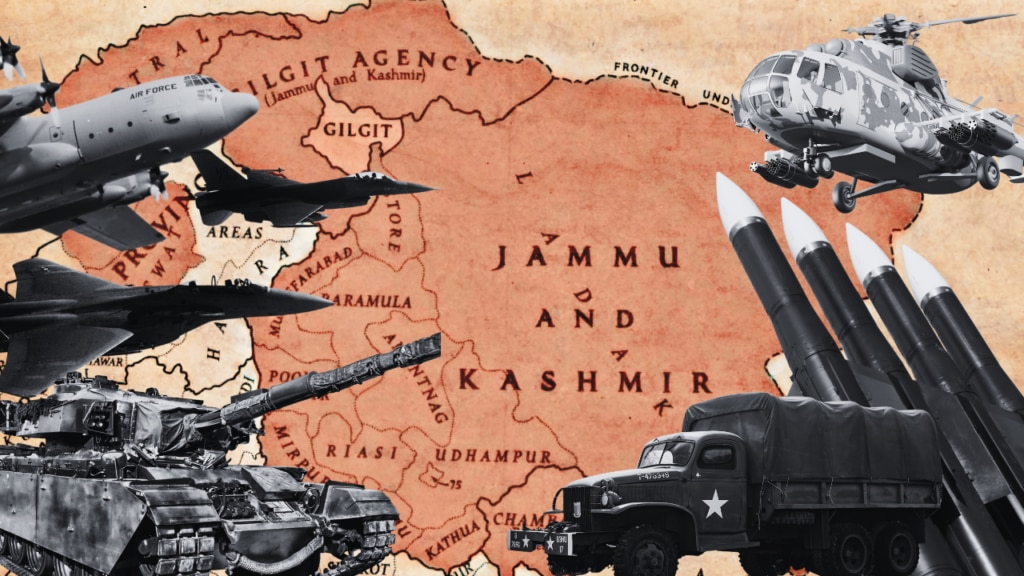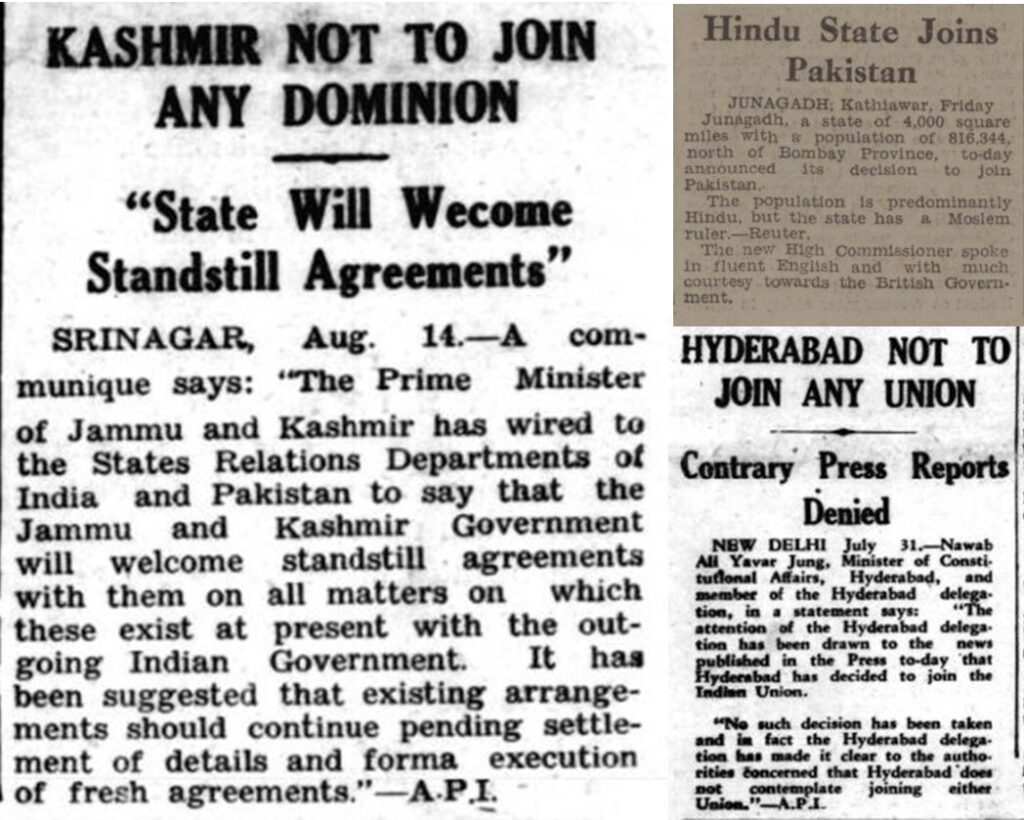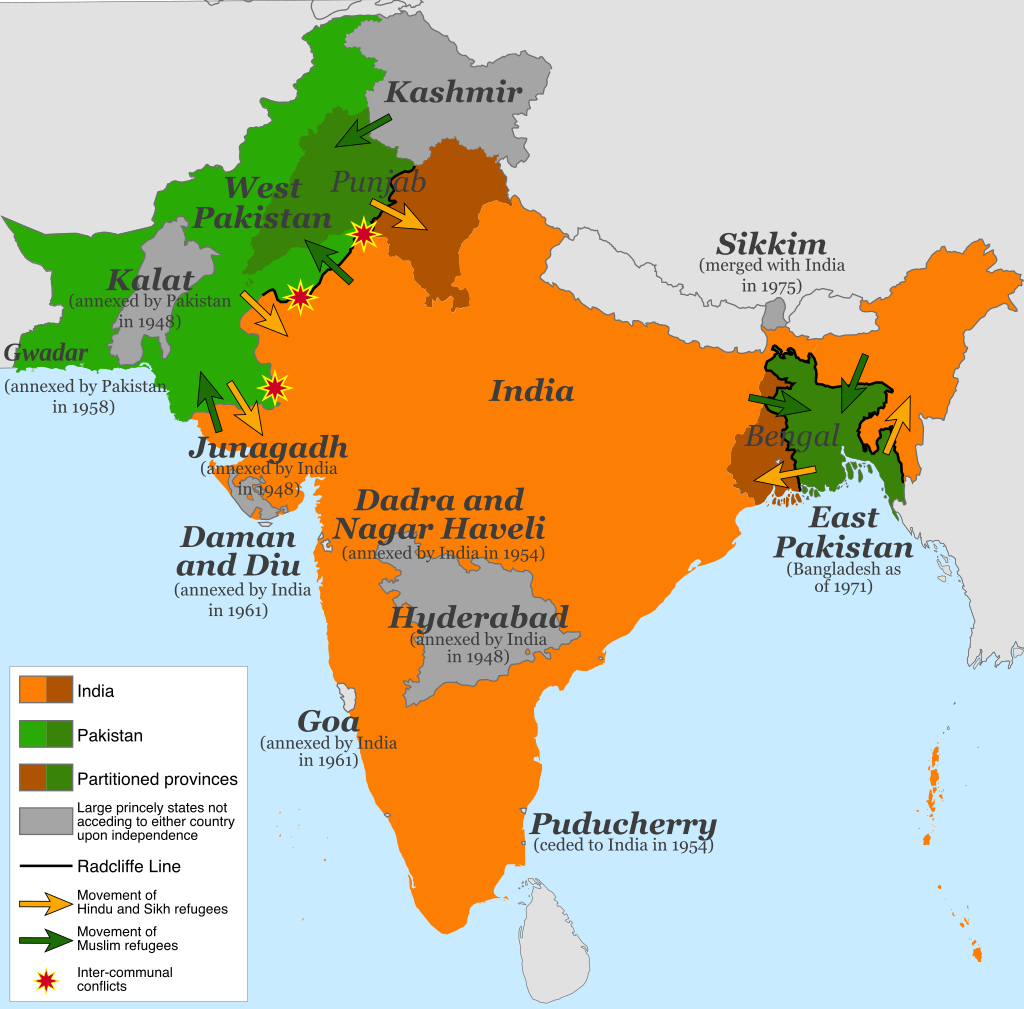
When India and Pakistan gained independence from British rule in 1947, various princely states were given the right to choose either the Indian Union or Pakistan.1 These states included Junagadh, Kashmir, Hyderabad and more.
Kashmir was a Muslim-majority state whose head was Maharaja Hari Singh. Unable to decide about the accession to any of the two new Dominions, he signed the interim standstill agreements.
Another princely state was Junagadh. It was a Hindu-majority state, ruled by Nawab Muhammad Mahabat Khanji III, who was a Muslim. He decided to accede to Pakistan.
Hyderabad, another Hindu-majority princely state, was ruled by a Muslim Nizam who had decided not to participate in the Constituent Assembly of either Pakistan or the Indian Union.

In early October 1947, the Indian Union helped form a Provisional Government of Junagadh in Bombay and the Nawab was overthrown. Following this, it was expressed in Pakistan that, in light of this development, the Pakistan Government could not be blamed if it supported any independent government of Kashmir established in its own territory. Hence, the Provisional Republican Government of Kashmir was established, which announced the overthrow of Hari Singh and the establishment of a new government.2
The then Ahmadiyya Khalifa, Hazrat Mirza Bashir-ud-Din Mahmud Ahmadra, also expressed at that juncture that since Junagadh had decided to accede to Pakistan, the Indian Union’s support for an independent government of Junagadh in Bombay warranted Pakistan’s support for any independent government of Kashmir that was formed within its territory.3
If logic had prevailed and justice had been implemented, the issues of Kashmir, Hyderabad and Junagadh should have been dealt with with a consistent formula, i.e., either on the principle that whichever side the Head of the State wishes to go or on the principle that the state can take a side only in accordance with the wish of its public.

If the Heads of the States were given the right, Kashmir would have joined India and Hyderabad and Junagadh would have acceded to Pakistan. On the other hand, if the public were given the right to choose, Kashmir would have acceded to Pakistan, while Hyderabad and Junagadh would have acceded to India. These two potential principles to settle the allocation of the princely states were highlighted by Hazrat Mirza Bashir-ud-Din Mahmud Ahmadra as well.4
Particularly speaking of the Kashmir State, its Raja wished to join India; however, due to the fact that its majority was Muslim and wanted to join Pakistan, it was not easy for him. Hence, he tried to initially create a split among Muslims by encouraging a section to declare neutrality (not wanting to join either India or Pakistan). Once this division was established, those Muslims who had broken away from the pro-Pakistan stance would then be pressured to support accession to India.
Hazrat Mirza Bashir-ud-Din Mahmud Ahmadra also commented on this matter and expressed that the Raja had “made a secret agreement with India and in order to show the world that the decision taken by Kashmir is in accordance with the opinion of the country’s majority, this decision is being hidden and an attempt being made to divide the Muslims.”5
On 27 October 1947, when Kashmir’s annexation to India was announced, Hazrat Mirza Bashir-ud-Din Mahmud Ahmadra expressed that Kashmir’s annexation to India had already been decided by Lord Mountbatten well before the Partition of India in August 1947, and that he had convinced the Maharaja of Kashmir to accede to India. He expressed that Lord Mountbatten’s attitude was not favourable towards Muslims. 6
In quest of a peaceful solution to the conflict of Kashmir, the Ahmadiyya Khalifa would always urge both governments to find a just and logical solution. He would also express fear that if efforts were not made to solve it, the conflict might sour and cause much havoc and tension. On one occasion, he said, “The time will testify that what is now being seen with the ‘eyes’ of reason, will also be testified with the incidents that will occur after some time.”7
Even one year after the Partition, no consistent formula was settled to resolve the conflicts of the princely states. On 13 September 1948, when India captured the Hyderabad State, Hazrat Mirza Bashir-ud-Din Mahmud Ahmadra wrote an article and stated:
“The truth is that, according to its circumstances, Hyderabad had to be acceded to the Indian Union, just like Kashmir should be acceded to Pakistan – considering its circumstances. […] In my view, if the issues of Hyderabad and Kashmir had been resolved simultaneously, the conflicts might not have arisen at all.”8
While both countries tried diplomatic avenues to resolve the conflict, even involving the UN, they also fought wars over this issue. The first war was fought in 1947-48, and in 1948, the issue of Kashmir was discussed in the United Nations.
The United Nations also failed to resolve the issue or to ensure the implementation of justice. While the Security Council’s verdict was awaited in 1948, Hazrat Mirza Bashir-ud-Din Mahmud Ahmadra stated:
“In my view, the Security Council’s verdict will not be based on rationale and justice.”9
In its resolution, dated 21 April 1948, the UN asked both India and Pakistan to implement a ceasefire and that “the question of the accession of Jammu and Kashmir to India or Pakistan should be decided through the democratic method of a free and impartial plebiscite.”10
At that time, the Ahmadiyya Khalifa continued to call for a peaceful and just solution to the conflict and highlighted that the situation was getting worse and expressed that “with the continuous delay in [finding a solution to] the issue of Kashmir, the fury amongst the people is intensifying.”11
Even with the UN involvement, the issue did not settle, and another war was fought in 1965. The Kashmir dispute and disputes over the sharing of water resources are intertwined, and hence in 1960, the Indus Waters Treaty was signed by India and Pakistan, with the World Bank being the mediator. The 1972 Simla Agreement was another attempt to bilaterally settle the issue, but alas, the conflict is still souring.
Last night’s clashes between Pakistan and India have increased the chances of another potential war between the two nuclear powers.
The international community seems quite alarmed at the recent conflict, which is still unfolding as we write these lines. The mainstream international media’s constant coverage of the situation is testimony to the fact that global powers have turned their eyes towards the region with a level of seriousness. Had these international powers acted in time and helped nip the entire issue in the bud, both India and Pakistan would have focused on real issues rather than investing energy, time and wealth on military warfare over Kashmir. Consequently, both nations would have been living amicably. This is what Hazrat Mirza Bashir-ud-Din Mahmud Ahmadra advised to both countries on 15 August 1947, when he said:
“We have a relationship with both of the newly established governments because the religious communities have no affiliation to a specific country or government. The members of our Jamaat are present in both Pakistan and India as well. […]
“Thus, on the occasion of this freedom and partition, we pray to God Almighty that He may grant progress to both these countries, enable them both to act with justice and equity and inculcate the spirit of love and affection between the people of both countries. May both countries strive to get better of each other – but through brotherhood, sympathy and sincerity – and in addition to the spirit of competition, they should also have the spirit of cooperation and sympathy.”12
Highlighting the need for peace and conciliation between the two nations, the Current Head of the Ahmadiyya Muslim Community, Hazrat Mirza Masroor Ahmadaa, recently expressed:
“May Allah the Almighty bring an end to oppression, protect the oppressed, and grant wisdom to governments, so that instead of advancing towards war, they resolve matters through peace and reconciliation, and become upholders of international agreements. May Allah the Almighty also grant the ability to international organisations – from which justice is seldom obtained these days – but may Allah make it so, and may He grant the ability both to these organisations and to the sympathisers and friends on both sides, enabling them to help resolve the issues between nations.”13
Endnotes
1. Indian Independence Act, 1947
2. Roznama Hamara Kashmir, Muzaffarabad, 4 October 1953; Aberdeen Press and Journal, 6 October 1947
3. Pakistan ki Siyasat-e-Kharijah, Anwar-ul-Ulum, Vol. 19, pp. 181-183
4. Kashmir Aur Hyderabad, Anwar-ul-Ulum, Vol. 19, pp. 239-242
5. Ibid., pp. 239-240
6. Kashmir Aur Pakistan, Anwar-ul-Ulum, Vol. 19, pp. 262-265
7. Ibid., p. 267
8. Al Fazl, 21 September 1948, p. 4
9. Qadian, Nankana Aur Kashmir, Anwar-ul-Ulum, Vol. 19, pp. 342-343
10. Resolution 47 (1948) / [adopted by the Security Council at its 286th meeting], of 21 April 1948; https://digitallibrary.un.org
11. Khutbat-e-Mahmud, Vol. 29, p. 199
12. Al Fazl, 16 August 1947, p. 2
13. Friday Sermon, 2 May 2025

